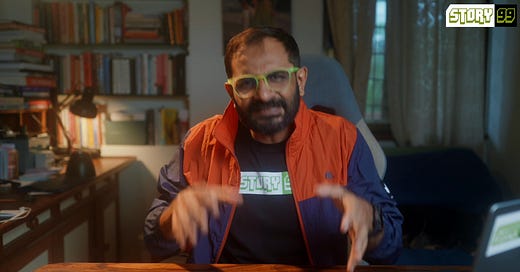‘As founders, you are always telling some story to someone or the other’.
- Tushar Garimalla, Co-founder, Aspire
Serve the underserved - let them Aspire
Aspire is both a fintech and an NBFC catering to sole proprietors in India - who represent a pretty underserved segment from a capital availability standpoint. Traditional lenders struggle to serve them efficiently due to OPEX and old-school credit models.
The reality is that most of these sole-propreitorship businesses (like say small restaurant owners) are actually stable long-term, many even multigenerational. Therefore, Aspire created a distinct tech based model, merging consumer tech and business credit risk to reach these businesses. It has essentially taken a "consumer lending tech approach" and applied it to business loans, blending it with a "business lending credit risk approach". It’s a unique combination. For the end customer, the immediate reality is often that Aspire is literally the only lender lending to them.
How storytelling helped Aspire secure partnership with Swiggy
Tushar fundamentally believes that whether it's a pitch to investors (who need both a compelling narrative alongside the hard data), or when you're pitching for partnerships, storytelling is critical.
For example, Aspire was able to crack partnerships with Swiggy on the back of a clear story - "loans that nobody else is doing" - which increases a partner’s overall coverage of loans across their base, making Aspire a net positive to their P&L.
Without the above story, Aspire would have been viewed as another small player offering high interest rates / small loans, making partners question why they should work together. But by framing it as providing the only offers to a subset of merchants, the value-prop became instantly clear. Narrating the value proposition in a way that the listener immediately gets it, is the story.
Even if you are a licensed business (like a fintech / NBFC) - which isn't exactly a commodity - if you don’t nail a strategic story, you can easily become a commodity compared to others within that licensed world. Getting someone to choose you over others needs a story that brings out the distinctiveness of your offering.
How do you prioritize storytelling when there are 99 other things to do?
As a founder one has to spend time between getting the story right versus just focusing on distribution. An ideal time to prioritize storytelling is probably when sales starts losing speed. Because if you are selling, you are most likely telling your story right.
While Aspire has its partner-facing story sorted for now, Tushar acknowledges that the impact of these loans on the end customers' lives hasn't been fully explored yet. Building a strong customer-facing story will definitely be beneficial for future direct sourcing.
Tushar also thinks that one "cannot outsource" building a company story entirely. The founder's role is crucial, requiring them to evolve their own storytelling abilities, with others helping to fill gaps.
Building trust is paramount, particularly in financial services.
The overarching story for Aspire - moving ahead - will be about being a trustworthy partner in a sole proprietor's financial journey. He shared a practical example about their attempts at a gold loan cross-sell product. Initially, just saying "we are Aspire fintech" wasn't enough; people would prefer established names.
When Aspire changed its approach to explicitly mentioning the trusted end-ender in the pitch, that significantly improved conversions. The need was to build a specific story, one focused on trustworthiness.
The story that will take Aspire from NBFC -> Bank
For now, the strategy is to potentially allocate more stable loan types to other NBFCs in the future, with Aspire's NBFC focusing on newer, less stable ones initially. But the big, long-term vision, the core ambition, is to become a bank. And the drive isn't just to be any bank. There's a "very mathematical view" behind it.
The idea is to build a bank grounded in technology, significantly reducing operational expenses compared to traditional models that rely heavily on personnel.
Building a tech-first bank from scratch is an incredibly difficult and long journey. But achieving the efficiency goals that Tuhsar has in mind - when achieved - will allow the cost of money to be lowered, enabling loans to be offered at a more accessible price point and benefiting the wider economy.
This has a massive potential for external economic impact, Tushar reminds me. They are already building a tech-stack that can handle various transaction sizes. The idea is to stay focused on retail banking rather than large corporate loans.
Storytelling isn’t just for the outside world!
Tushar also made a point about challenges within large organisations - sometimes, getting things done requires giving "all sorts of stories to people". Internal coordination and convincing colleagues can consume significant time and effort. It seems storytelling is "perennial in the corporate world".
Reflecting on all these points, I guess we can all conclude that the power of narrative is undeniable. Whether it's articulating your value proposition to partners, building trust with customers, defining your long-term vision, or even navigating internal dynamics, the ability to tell a clear, compelling story seems absolutely essential for anyone building a tech business today.
If you are a tech founder reading this, all the best building what you are building and may you get to tell powerful stories! Because great storytelling is good business. I would love to feature you in this series as well - just block a time here on my Calendly.









Share this post